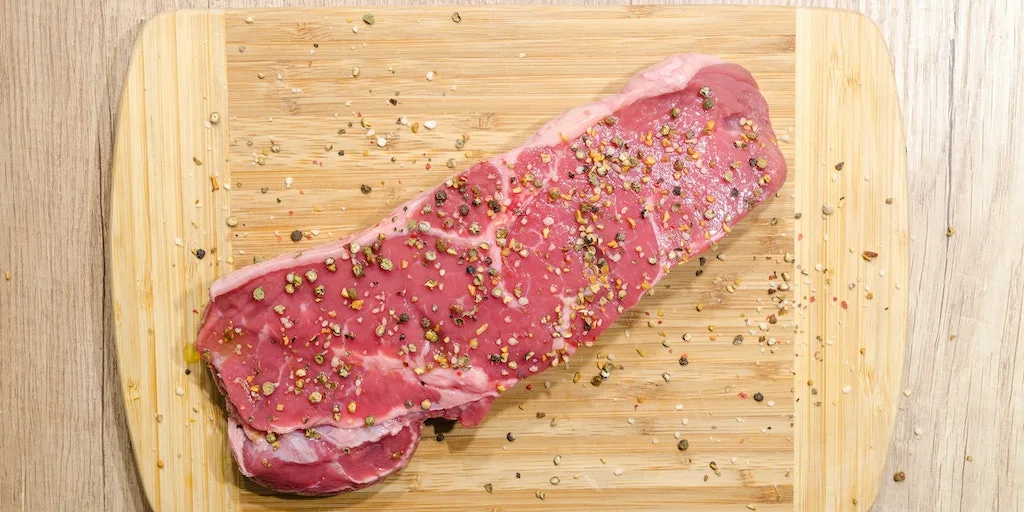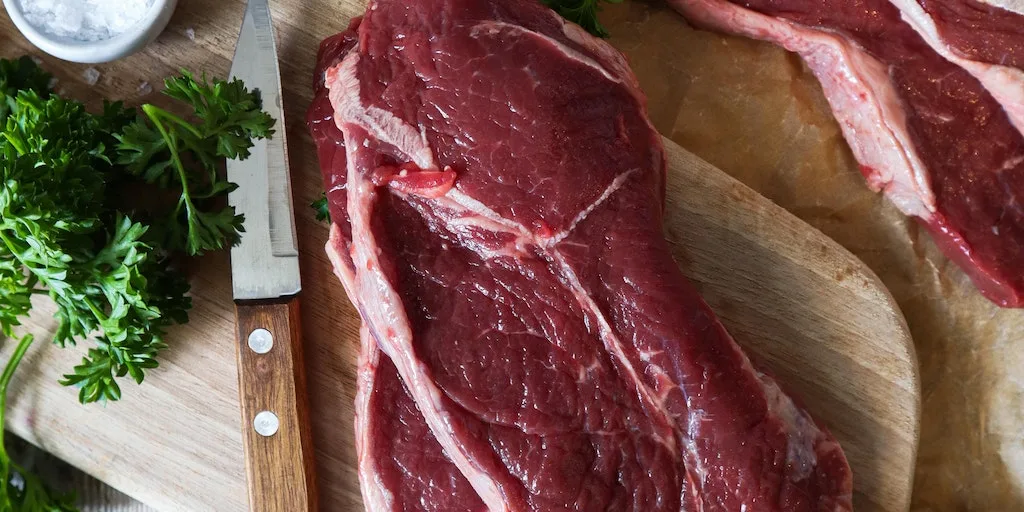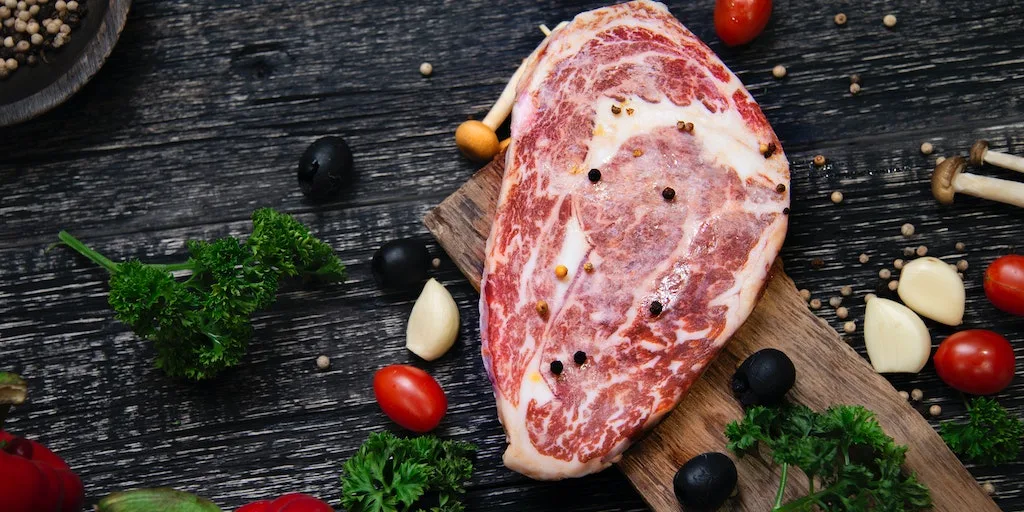What happens if you eat raw meat consistently?
Eating raw meat on a regular basis can have serious health consequences.
Here are a few dangers of consuming raw meat:
Bacterial Infections
Raw meat can contain dangerous bacteria such as Salmonella, E. coli, and Listeria.
These bacteria can cause food poisoning that results in vomiting, diarrhea, fever, and abdominal cramps.
Parasitic Infections
Raw meat can also contain parasites such as tapeworms and roundworms that can cause serious infections.
These parasites can live in your body for years without showing any symptoms, but they may eventually lead to malnutrition and other complications.

Nutritional Deficiencies
Although raw meat is a good source of protein and iron, it lacks other essential nutrients that are destroyed during cooking.
Eating nothing but raw meat for an extended period of time could lead to nutritional deficiencies that could affect your health.
In conclusion, eating raw meat regularly is extremely dangerous and should be avoided at all costs.
The risks of bacterial or parasitic infections are too high to make it worth the risk.
Can a human survive on raw meat?
Eating raw meat has been a controversial topic for many years.
Some people believe that consuming raw meat is healthier than cooked, while others think that it can pose serious health risks.
However, the question remains, can humans survive solely on raw meat?
Dangers of consuming raw meat
Raw meat can be a breeding ground for bacteria such as E.coli and Salmonella.
These bacteria can lead to food poisoning, which can cause symptoms such as vomiting, diarrhea, and fever.
In severe cases, it could even lead to death.
Cooking the meat properly can kill the bacteria and prevent any potential health risks associated with consuming raw meats.
Nutritional value of raw meat
Raw meats are known to have high amounts of protein and essential nutrients like vitamin B12, iron, zinc, and omega-3 fatty acids.
These nutrients are necessary for our bodies’ growth and development.
Variety in diet
Eating only raw meat may not provide enough variety in the diet to meet all nutritional needs needed by our bodies.
Eating a balanced diet that includes fruits and vegetables provides all necessary nutrients from different sources.

Balancing risks vs benefits
The decision to consume raw meat depends on balancing the potential health risks vs benefits.
People who consume raw meats must follow strict hygiene practices such washing hands before handling food, keeping their utensils clean before use,and regularly cleaning their kitchen surfaces to avoid cross-contamination.
In conclusion, although some individuals might be able to survive solely on eating raw meat, it’s not advisable because this could be dangerous.
As per medical advice,a balanced diet including various types of proteins like cooked meats will provide adequate nutrition for overall good health.
How much raw meat is too much?
Eating raw meat can be dangerous and it’s important to know the safe amount to consume.
Consuming too much raw meat comes with health risks like bacterial infections and parasitic infestations.
Serving size
The amount of raw meat you consume should depend on your body weight and the type of meat.
As a general rule, a serving size of raw meat should be no more than 4 ounces or 113 grams per meal.
This can vary depending on your level of physical activity and metabolism.
Frequency
Eating raw meat everyday is not recommended as it can increase the risk of foodborne illnesses.
It’s important to space out meals that contain raw meat to avoid overconsumption.
Twice a week is considered a safe limit.
Type of meat
Not all types of meats are suitable for consumption in their raw state.
Meat from larger animals like cows or pigs have higher risk for bacterial infections and parasites due to their size and living environments.
On the other hand, smaller animals like fish or chicken carry less risk when consumed in their raw form if they have been properly handled and stored.
Personal factors
Your personal health condition plays a role in determining how much raw meat you should consume.
People with weakened immune systems or pre-existing health conditions like HIV, diabetes, liver disease or pregnant women must avoid consuming any type of raw meat.
In conclusion, eating small amounts of high-quality lean cuts of beef, poultry, fish or wild game that have been properly handled with minimal processing will have little risk for healthy individuals when consumed in moderation.
Why do I crave raw meat?
It is not uncommon for people to have cravings for certain foods.
Raw meat, in particular, is one that some individuals may crave.
This could be due to a number of reasons, such as:
1. Nutritional deficiencies
Craving raw meat could be an indication that your body is lacking certain nutrients.
Raw meat contains a variety of vitamins and minerals, including iron and B vitamins, that are essential for overall health.
If you are deficient in these nutrients, your body may crave raw meat as a way to obtain them.
2. Bacterial infections
Interestingly, some studies have suggested that individuals who crave raw meat may have bacterial infections in their digestive systems.
These bacteria can manipulate our brain chemistry to persuade us to eat foods that they thrive on – including raw meat.
3. Psychological reasons
Some people simply enjoy the taste and texture of raw meat and crave it for that reason alone.
This could be due to cultural reasons or personal preferences.
In any case, consuming raw meat consistently can lead to adverse health effects and it is important to take precautions if you have these cravings.
Always make sure that any meat that you consume is properly cooked to avoid the risk of foodborne illnesses such as Salmonella or E.coli infections.
It is also recommended to discuss any unusual cravings with your healthcare provider to rule out underlying medical conditions or nutritional deficiencies.

Why do I like to eat raw meat?
Raw meat is an acquired taste and not everyone likes it.
However, for those who enjoy eating raw meat, there can be several reasons behind their liking.
Taste Preference
The taste of raw meat is often described as rich and flavorful by those who like it.
The texture and juiciness of raw meat can also add to the overall eating experience.
Nutritional Benefits
Raw meat contains more nutrients than cooked meat as cooking destroys some of the nutrients.
Those who like to eat raw meat may do so because they believe it is healthier as they are getting the maximum nutritional value from their food.
Cultural or Personal Influence
In some cultures, eating raw meat is a common practice.
For example, in Japan, sushi made with raw fish is a popular dish.
Some people may also have personal preferences influenced by their upbringing or life experiences that lead them to enjoy eating raw meat.
It’s important to note that while some people may enjoy eating raw meat, there are risks associated with it such as bacterial infections and harmful pathogens.
It’s crucial to handle and prepare raw meat safely if you choose to consume it in its uncooked form.
In conclusion, liking the taste of raw meat or preferring it for its nutritional benefits or cultural influence are all reasons one might enjoy consuming uncooked meats.
However, it’s important to remain aware of the potential health risks associated with consuming raw meats and take precautions accordingly.
How many days can you eat raw meat?
Eating raw meat is not recommended as it poses a risk of foodborne illness.
However, if you insist on consuming raw meat, it is essential to know how long you can consume it safely.
The Shelf Life of Raw Meat
The shelf-life of raw meat depends on various factors such as the type of meat and how it’s stored.
Generally, fresh meats such as beef, pork, lamb, and veal can be stored in the refrigerator for three to five days before they spoil.
On the other hand, ground meats such as beef and poultry have a shorter shelf life and should be consumed within one to two days after purchase.
Eating Raw Meat Beyond Shelf Life
Consuming raw meat beyond its shelf life increases the risk of developing a foodborne illness caused by bacteria like E.Coli, Salmonella or Campylobacter.
Avoid Eating Raw Meat Frequently
While there may not necessarily be a limit on how long you can eat raw meat – since it isn’t recommended at all – eating it frequently can increase your risk exposure to foodborne illnesses.
It is advisable to avoid eating raw meat regularly regardless of whether or not you have experienced adverse effects from consuming them so far.
Conclusion
In conclusion, eating raw meat entails significant risks that cannot be overemphasized.
Avoiding raw meat altogether is highly recommended by health experts.
If you must consume this type of food occasionally, make sure that it is well-cooked before consuming.
Can you get sick from eating too much raw meat?
Potential risks of consuming raw meat
Eating raw meat, especially on a regular basis, can increase the risk of foodborne illness.
Raw meat can be contaminated with harmful bacteria such as Salmonella, E. coli, and Campylobacter, which can cause symptoms like nausea, vomiting, diarrhea, and fever.
How much is too much?
The amount of raw meat that is considered safe to consume depends on various factors such as the type of meat and the individual’s overall health condition.
Generally speaking, it’s recommended to limit the consumption of raw meat to small portions and in moderation.
Tips for minimizing risk
If you prefer eating raw meat or follow a carnivorous diet that includes raw meat, there are steps you can take to reduce the chances of getting sick.
Here are some tips:
- Choose high-quality cuts from reputable sources.
- Store and prepare the meat properly by keeping it refrigerated until ready to consume and ensuring proper cooking temperature if cooked.
- Wash your hands and any surfaces that come into contact with the raw meat before and after handling it.
- Avoid cross-contamination by using separate utensils for handling raw and cooked meats.
The verdict
While some people may enjoy consuming raw meats like steak tartare or sushi regularly without getting sick, it’s important to note that there are always potential risks involved.
It’s always better to err on the side of caution by practicing safe handling techniques and limiting consumption.
If you suspect that you may have contracted a foodborne illness from consuming raw meat or experience any symptoms after eating it, seek medical attention immediately.
Does eating raw meat have benefits?
Eating raw meat can provide certain nutritional benefits that are not present when the meat is cooked. Here are some of the potential benefits:
More Nutrients
Raw meat contains a higher amount of nutrients such as iron, zinc, and Vitamin B12 than cooked meat.
These nutrients can be lost during the cooking process, especially if you use high heat or overcook the meat.
Improved Digestion
Cooked food can be more difficult to digest because it reduces the enzyme activity in our digestive system.
Raw meat is easier to break down since it still contains active enzymes that aid digestion.
Boost in Energy Levels
Eating raw meat can increase your energy levels due to the high protein and fat content.
These nutrients help to stabilize blood sugar levels and provide longer-lasting energy than simple carbs.
However, it’s important to note that consuming raw meat comes with serious health risks as well.
Raw meat can contain harmful pathogens such as E.coli, salmonella, and listeria that can cause food poisoning and other complications.
It’s essential to take proper precautions such as sourcing high-quality meats from a trusted supplier and handling them properly before consuming them.
In conclusion, while there may be some potential nutritional benefits of consuming raw meat, it’s generally not recommended due to the significant risks involved.
It’s always best to cook your meats thoroughly to avoid foodborne illnesses and other complications.
Did cavemen eat raw meat?
Cavemen, also known as early humans, are known for their hunting and gathering lifestyle.
However, there is debate about whether or not they ate raw meat.
Evidence of raw meat consumption
Some studies suggest that early humans did consume raw meat.
This is supported by:
- Archaeological findings of butchery marks on animal bones
- Historical records of indigenous people who still follow a hunter-gatherer lifestyle and consume raw meat
The benefits of eating raw meat for early humans
Early humans had limited access to fire and technology needed to cook meat.
Therefore, eating raw meat was likely a necessity for survival.
Raw meat provided essential nutrients such as protein, iron, and vitamin B12.
The risks of consuming raw meat today
While early humans may have survived on a diet that included raw meats, consuming raw or undercooked meats today can increase the risk of foodborne illnesses such as salmonella and E.coli.
It is recommended to cook all meats thoroughly before consumption.
Conclusion
It is believed that early humans did eat raw meat out of necessity for survival.
However, with advancements in technology and knowledge about food safety, it is not recommended to consume raw meats in modern times.
If you are considering adopting a new dietary habit like eating only raw meats or looking for options that fit your nutritional needs contact your healthcare professional.
What did cavemen eat?
Cavemen lived in a time before agriculture and domesticated animals, so their diets consisted of mainly what they could hunt and gather in the wild.
They were known to be hunters and gatherers, always on the move in search of food.
Hunting
Hunting was one of the primary ways cavemen obtained their food.
They hunted a wide array of animals, including deer, bison, elk, wild boar, and smaller game.
They also trapped fish and small game such as rabbits.
Gathering
Cavemen also gathered fruits, vegetables, nuts, and seeds that were available in their environment.
Some of the foods they gathered included berries, acorns, roots, and mushrooms.
Tools and methods used in cooking
Cavemen used fire to cook their meat which would have made it safe to consume.
They also used sharp rocks for cutting meat and shells or animal hides for holding liquids or as bowls.
The importance of protein intake for cavemen
Protein was crucial for cavemen who needed it for building muscle mass as well as repairing tissues.
Animal meat provided them with a good source of protein.
They also obtained some protein from the nuts and seeds they gathered.While it is interesting to understand what cavemen ate back then to survive, it is important to note that our bodies have adapted over time due to changes in our environment and lifestyle.
We now have access to a wide variety of foods that provide all the necessary nutrients required for good health.
It is not recommended to switch entirely to a diet consisting of only raw meat like our ancestors as it can lead to serious health problems due to bacterial infections associated with raw meat consumption.

Ingredients
- 1/3 pound of beef tenderloin
- arugula
- 2 teaspoons of capers
- 2 teaspoons of wine vinegar
- 4 teaspoons of olive oil
- black pepper
- sea salt.
Instructions
- For best results, freeze the beef tenderloin until it’s very firm but not completely frozen, which should take about 1-2 hours. As the beef chills, place the plates in the refrigerator to cool.
- Once the beef is firm enough, slice it into very thin pieces against the grain and arrange them on the chilled plates.
- Top each serving with a generous amount of arugula and capers, and drizzle them with vinegar and olive oil.
- Finally, add a pinch of freshly cracked black pepper and sea salt to taste.
- Serve right away while it’s still fresh and delicious.
